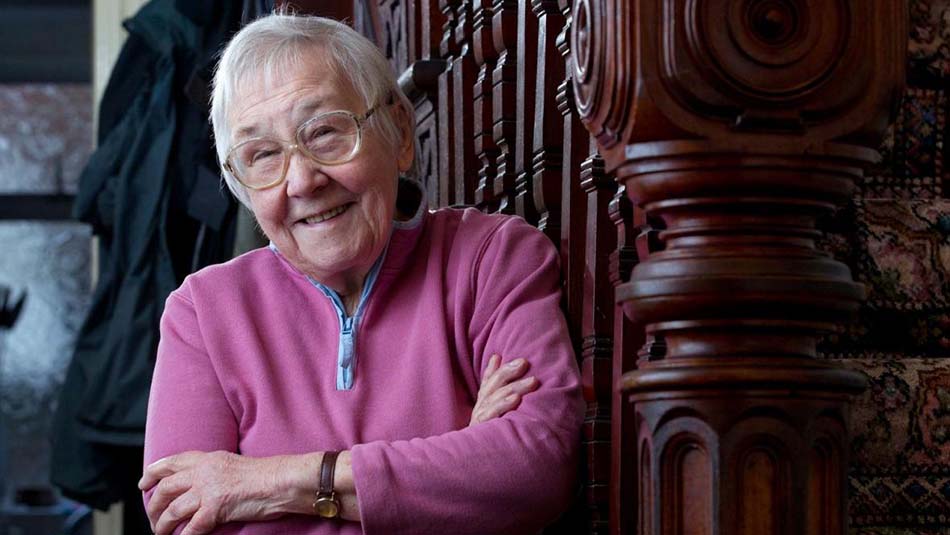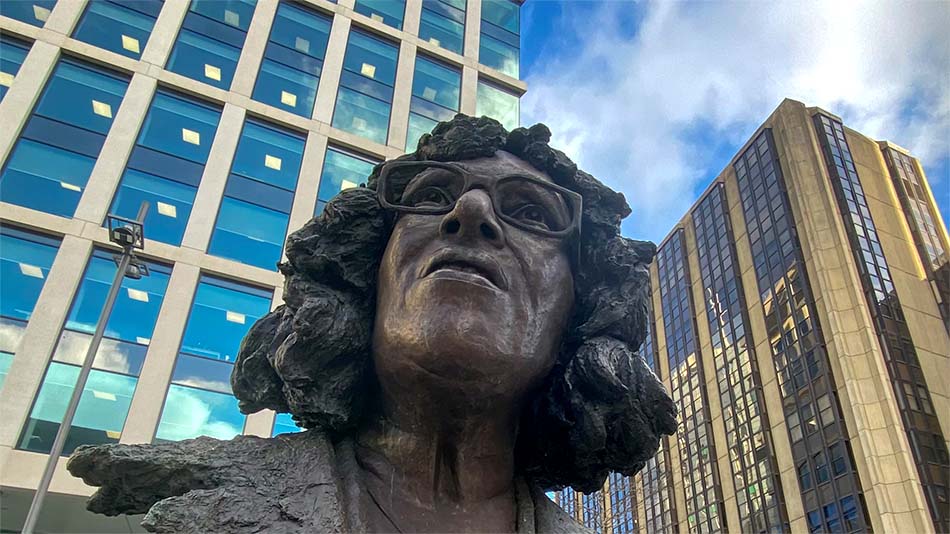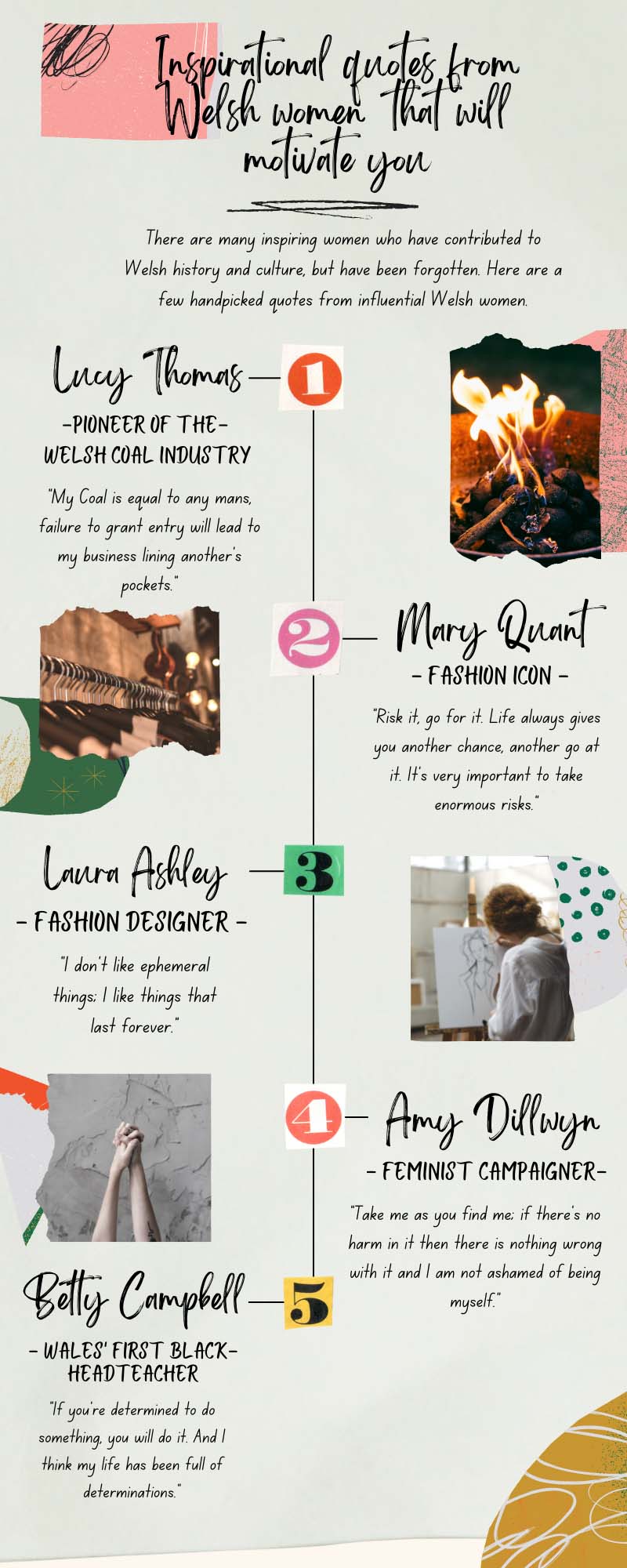A statue commemorating the feminist writer and evolutionary theorist Elaine Morgan will be unveiled at her hometown in Wales.

Over a hundred years ago, a woman was born into a poor mining family in the village of Hopkinstown who went on to create some of the best-loved television dramas of the twentieth century, impacted American feminism, and revolutionised conceptions of evolutionary theory.
Following a campaign by the Monumental Welsh Women group, a statue to honour the pioneering writer, evolutionary theorist, and feminist icon Elaine Morgan will be unveiled outside of Meddygfa Glan Cynon Surgery in Mountain Ash this Friday. After the successful unveiling of the Betty Campbell Monument in Cardiff last year, this will be the second statue of a named, non-fictionalised woman to be installed in a public space in Wales.
The group’s vision is to commemorate the achievements of outstanding Welsh women while inspiring the next generation of Welsh women to achieve their ambitions. “What drove us was the fact that we are always talking about role modelling for girls and trying to encourage people to do things outside of their comfort zone,” said Helen Molyneux, founder of the Monumental Welsh Women group. “But unless you see other people doing that and see their achievements applauded and recognised, it is very difficult to galavinise yourself.”
Within the next five years, Monumental Welsh Women hopes to create five sculptures honouring Welsh women in various locations throughout Wales. The other three women that have been shortlisted are Margaret Haig Thomas (Lady Rhondda), Elizabeth Andrews, Sarah Jane Rees (Cranogwen).
Molyneux said that the group were aware of significant women who had accomplished a great deal in their lives, but that they had received no recognition for their contributions to Welsh culture. “What was really interesting was when you talk to people about it, they say there aren’t any or they can’t think of anyone who deserves a statue and that was the worst thing because then you realise that not only are these women not recognised, but they are completely forgotten.”

Elaine Morgan was an icon for women across the world well into her later life, and even though she won a scholarship to Oxford University, she never strayed from her Valleys roots. When Elaine arrived in Oxford, it was assumed she was applying for a job as a cleaner, yet she excelled as a student, attending political societies and sharpening her literary skills.
Elaine Morgan was regarded by Molyneux as a “fascinating character” who would inspire future generations. Her career as a writer began when she joined the BBC in the 1950s, becoming one of the first women to make a mark in the male-dominated world of television at the time. Her first television screenplays were accepted even before she had a television set.
“I grew up watching her programme called The Life and Times of David Lloyd George,” said Molyneux. “It was so gripping and a fantastic story.”
By the 1970’s, Elaine Morgan would go on to challenge the scientific establishment with a new theory of human evolution. Molyneux said, “She started to writing about evolutionary theory, but from a feminist perspective. So, her argument was that all the evolutionary theorists from Darwin onwards, had only ever looked at men…and she said if you actually look at the way women have evolved, there’s a whole different story.”
She never left the Valleys, despite becoming a feminist icon in America with the publication of The Descent of Woman, a crucial text in the Women’s Liberation movement. “One of our colleagues in the group, Angela Jones, Professor of History, always says that Elaine had roots as well as wings,” said Molyneux.
Emma Rodgers, a renowned sculptor known for portraying both action and delicacy in her sculptural works, created and sculpted the statue of Elaine Morgan, which will be unveiled in Mountain Ash on Friday.
The Monumental Welsh Women campaign aims to inspire future generations of women to understand that women have always achieved and accomplished their ambitions. “Women have always been instrumental in history…it’s just that their contribution wasn’t recognised.”
“The five women we’ve chosen really do deserve recognition,” said Molyneux. “They’re amazing women when you read their histories and their stories.”
“I’m hoping that our campaign will help redress the balance and I hope that by doing what we’ve done that when people are thinking about what should be celebrated, and what contributions are being made, that people will actually think, let’s look to see if women have contributed rather than assuming that it’s always men.”

